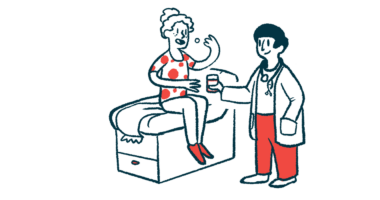News flash: Not every doctor knows what a PNH diagnosis means
Explaining my case to medical professionals has made me an advocate

My view of doctors and their expertise has greatly shifted through my years of living with a rare disease. At one time I held the weight of their knowledge, degrees, and experience to be the end-all-be-all because they were professionals when it came to anything related to medicine. I wouldn’t question them, get second opinions, or even think that they might not be experts on everything.
My first experience of explaining to a medical professional (not in hematology) my rare disease, paroxysmal nocturnal hemoglobinuria (PNH), made me feel so defeated. Going to the hospital shortly after my diagnosis, the emergency triage worker signed me in and asked what felt like a million questions about my pain level, age, and medical history. I told her I have PNH. She looked at me as if I had 10 heads and questioned if I were making up the disease and if it were an actual diagnosis.
I’d just gone through a traumatic medical emergency only a month prior that led to my diagnosis. I’d been poked with needles countless times, received a blood transfusion, and had a bone marrow biopsy — and then was questioned if I was making this up? I understood that this woman wasn’t a doctor or nurse, but I viewed her as a medical professional. Hearing that she had no idea of my disease was eye-opening. I needed to be my own advocate.
PNH was still new to me. I didn’t know how to explain it to her. She marked my file with a puzzled look and sent me back to see the doctor. However, the doctor wasn’t familiar with PNH, either. I was taken aback; I always thought the hospital was supposed to know everything and have all the answers. He reached out to my hematologist, quickly educated himself on it, and was able to treat me, but this wasn’t the only experience I had explaining PNH to a medical professional.
Almost every doctor I’ve seen outside of hematology had no clue what PNH was. I had to explain the basics to my gynecologist at annual checkups, to walk-in clinic doctors, and even to the surgeon who removed my gallbladder. I’ve always instinctively trusted medical professionals and their expertise, but it does taint my view when they have no knowledge of my most important medical diagnosis.
After a few years of having PNH, I needed to change my primary care physician for insurance reasons. I was uneasy about meeting a new doctor and going through the same experience yet again, but I started changing my expectations and just assumed no one would be familiar with my disease. To my surprise, my new doctor knew about PNH! I can’t even explain the sigh of relief I had to hear that. She wasn’t a PNH expert, but for her to have even basic knowledge of it made me feel like I was receiving great care for my specific case.
I’ve come to realize that having a rare disease not only means the patients are rare, but finding medical professionals with knowledge of the disease is also rare. That doesn’t mean they aren’t able to help you or give you proper care; it just means you have an opportunity to be your own advocate. Educate them on PNH and connect them with your hematologist directly. I once had my dentist call my hematologist to discuss what type of Novocain (procaine) would be safe with PNH before I had dental work.
Recognizing that there will be doctors, nurses, and other medical professionals in my life who aren’t aware of PNH has really helped my mental health at appointments. Going in with that mindset has helped me avoid disappointment when I’ve needed to have that conversation about my medical background.
I give them grace when they admit they’re not familiar with it, and they give me a chance to speak even though I don’t have a medical degree. It almost puts us on the same playing field. With that said, I go to new appointments with my lab work handy, my medication list with doses and frequencies, my hematologist’s contact information, and most important, a smile ready to meet someone new!
Note: PNH News is strictly a news and information website about the disease. It does not provide medical advice, diagnosis, or treatment. This content is not intended to be a substitute for professional medical advice, diagnosis, or treatment. Always seek the advice of your physician or other qualified health provider with any questions you may have regarding a medical condition. Never disregard professional medical advice or delay in seeking it because of something you have read on this website. The opinions expressed in this column are not those of PNH News or its parent company, Bionews, and are intended to spark discussion about issues pertaining to paroxysmal nocturnal hemoglobinuria.




